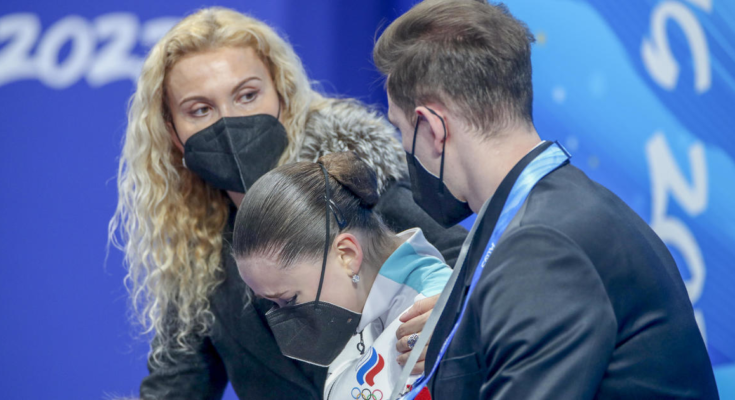Kamila Valieva’s Olympic debut was clouded with controversy after it was discovered that she tested positive for a banned heart medication. But for IOC President Thomas Bach, it was the way the 15-year-old’s coach treated her with “tremendous coldness” that “disturbed” him the most.
The Russian figure skater seemed to crumble under the pressure of the past week during her final performance at the Beijing Olympics on Thursday. She helped her team win gold during the figure skating team event, and had been dominating the individual women’s events. But she was visibly distressed in her final skate on Thursday, falling twice and failing to land any of her quad attempts during her routine, resulting in a fourth-place finish.
At the end of her event, she seemed to cry in exasperation as she made her way off the ice. As her results were announced, she was sitting in between two of her coaches, who seemed to be visibly frustrated with the outcome.
IOC President Thomas Bach addressed the situation on Thursday following the performance, saying that, for the most part, athletes at the Winter Olympics have had an “unprecedented Olympic spirit” in light of COVID-19.
Most athletes, he said, were giving and met with love, support and celebration throughout the Games, Bach said, “and then there’s also the very sad story of Kamila Valieva.”
Bach said he was “very, very disturbed” by what he witnessed in her competition, starting with her final routine. It was clear to him, he said, that she was under immense pressure.
“To see her there struggling on the ice, seeing how she tries to compose herself again, how badly she tries to finish her program,” he said. “You could in every move read the body language, you could feel that this is an immense, immense mental stress and maybe she would have preferred to just leave the ice and try to leave this story behind her.”
But what stuck out to him even more so, he said, was what happened next.
Video shows that when Valieva stepped off the ice following her final event, her coach, Eteri Tutberidze, approached her with questions of why she did not perform better.
“Why did you let it go?” she said. “Why did you stop fighting?”
“When I afterward saw how she was received by her closest entourage, with such what had to be tremendous coldness, it was chilling to see this,” Bach said. “Rather than giving her confidence, rather than to try to help her, you could feel this chilling atmosphere, this distance, and if you were interpreting the body language of them, it got even worse because this was kind of dismissive gestures I saw there on TV.”
His suspicions about the cold atmosphere were confirmed, he said, after video started circulating of fellow Russian skater Alexandra Trusova becoming angry with her silver medal finish when her teammate Anna Shcherbakova, won gold. Her reaction is a rarity among the games, where most teams show camaraderie throughout events.
“Everyone has a medal, everyone has, but I don’t!” Trusova said in Russian, according to USA Today.
Bach said that all of this indicates the “impression I had last night was not the wrong one.”
“All of this does not give me much confidence in this closest entourage of Kamila, neither with regard to what happened in the past nor as far as it concerns the future,” he said. “…I can only wish for her that she has the support of her family, the support of her friends, and the support of her people who help her over this extremely difficult situation. We can only hope for her that this is addressed in the right way.”



